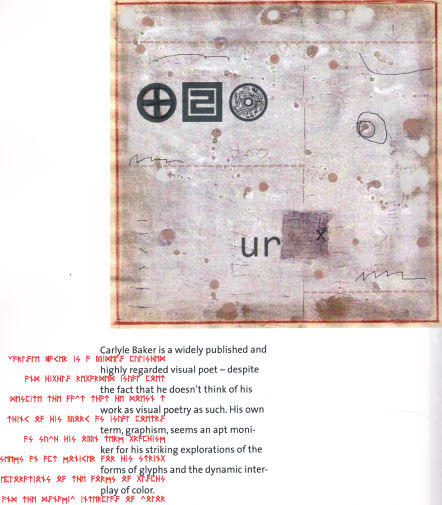Entry 1019 — Something from a Year Ago
I’m in the process of going through previous blogs to figure out what I managed to accomplish last year, if anything–strike that: I know I did accomplish a few things. Anyway, I found this at the first entry I dipped into (which was posted 11 December 2011):
I copied the whole page of the anthology it’s on, hence the text below it. As soon as I saw it again, I liked it as well as I liked it the first time I saw it. Here’s what I said about it in my other entry: “I have a lot of trouble saying why I like this–extremely like this. I do know that I am automatically attracted to anything with the word, “ur,” in it. Beginnings, origins, the number one. The work seems to me simultaneously some sort of alchemical diagram, a map of a section of an archaeological dig, a frame from a film of a dream, a “careworn and coffee-stained map” of a lost country (as bleed editor John Moore Williams muses in the text accompanying the full set of four pieces this one is the first of), maybe even a piece of square currency from some mystical secret nation . . . Baker says of the set that “most of these pieces begin hand-drawn in ink, pencil crayon, watercolor, etc., and later are altered in a paint program”–much as the graphics in my work are. My only gripe: he apparently doesn’t title his works–if he does, the titles have been omitted in the anthology I found it in.”
Do I have anything to add? A little. One is the importance visually and conceptually of the extremely un-organic elements: the rectilinear border, the three black symbols (two circles and a square, and black), the word, “ur” and the x. The lines of dashes, too. In short, a layer of conceptuality over a layer of Nature. What would formerly be called a marriage of the perceived and the understood if “marriage” still meant what it used to. So I’ll call it a wonderful dichotimfusion.
Amusing that I, the generally exclusive taxonomist, want to call it a visual poem (because of the word, “ur”) but its maker, Carlyle Baker, prefers the word, “graphism” for it.
.
